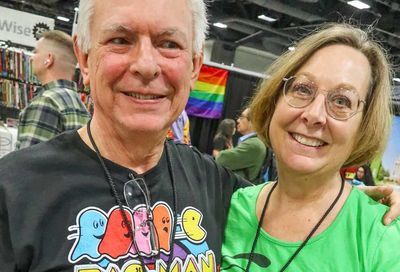Revolutions
Something You Did looks at the frustrating nature of the past and those things that simply cannot be undone
We all have that negative thing that lurks in the back of our head with surprising ferocity. Maybe it was a moment of humiliation so strong and palpable that, years later, it can still cause a pit to open up in the bottom of your stomach.

Prison play: Foucheux and Hazlett
(Photo by Stan Barouh)
Maybe it was a moment of anger or cruelty – intentional or not – that retains the power to make your skin crawl.
Maybe it’s a moment of regret over a thing said or not said that necessarily has to go without possibility of repair.
Willy Holtzman’s Something You Did looks at the frustrating nature of the past and those things that simply cannot be undone. The things that haunt and the things that leave their indelible marks on us. The play is an exceptionally thoughtful examination, full of nuance and thought-provoking considerations, but Holtzman’s writing has a habit of causing his characters to drift from dialogue to speechmaking. While the cast assembled for Theater J’s production makes solid work of the sometimes workmanlike script, patience is required to reach the show’s very satisfying final note.
Alison Moulton (Deborah Hazlett) has served 30 years for a crime she fully admits to committing. The former member of a radical activist group – a group whose past anti-war activities are now being cast by neo-conservative pundits as domestic terrorism – Alison was convicted for a bombing that resulted in the death of a police officer.
We meet Alison just days before her next parole hearing. Her father (who was also her attorney) has recently died, leaving his partner, Arthur Rossiter (Norman Aronovic), to see her case through. Alison’s family traveled in a kind of politically progressive high society, with her father eulogized by Bill Clinton, and honored by Nelson Mandela, Madeline Albright and Joan Baez.
But where the senior Moulton was a media darling and activist icon, Arthur is a self-proclaimed street fighter, chasing ambulances and defending whoever he had to in order to keep the practice going. Arthur has decided to do whatever it takes to get Alison paroled, even if it means forcing her to make uncomfortable bedfellows with far-right, multimedia talking head Gene Biddle (Rick Foucheux).
The intelligence and relevance of Something You Did must be recognized and given appropriate credit. Playwright Holtzman has set a brilliant collection of story arcs in motion and filled his complex narrative with wonderfully realized characters that have the weight and depth of real human beings. While we are looking at a group of individuals largely placed at extreme poles from one another – Alison and Gene, Rossiter and the slain policeman’s daughter Lenora (Aakhu Freeman) – they are neither set pieces nor cartoons.
And Holtzman is asking some important questions about the costs of mercy, the demands of justice and the immutability of past wrongs. But we are too often shaken from the world he has so painstakingly rendered by exchanges that sound more like the voice of a playwright than the emotions of a character. The desire to engage and incite overwhelms and the beautiful, sure hand of Holtzman’s writing fades behind a wall of words.
Taking control and drawing an exceptional performance out of things is Hazlett. As an actor, Hazlett is unafraid to step out of bounds every now and again, playing her character’s bravado as a very thin shell. She’s uncertain and terrified and Hazlett metes those emotions out in measured, careful doses.
It’s a performance that matches nicely with Foucheux’s Gene, a man who, unlike Alison, appears to question nothing about his past or his present. Everything can be justified. Everything is subject to editing and revision. Foucheux gives us a Gene who is distasteful, infuriating but, oddly, not fully a villain. To craft the man in such a limited palate would be too easy and Foucheux resists the temptation.



To Oct. 3
Theater J
1529 16th St. NW
$35-$55
800-494-TIXS
theaterj.org
Exceptionally enjoyable to watch is Lolita-Marie as Uneeq, a corrections officer who has become Alison’s friend and confidant. While Uneeq is certainly not intended to only be a kind of comic foil to the exceptional weight of the play, Lolita-Marie is a skillful actor who clearly understands the importance of her role. She is the light that allows us to more clearly see what is at stake. Uneeq is the contrast, the character whose life has not allowed her to become as single minded as the individuals around her. Her world, while smaller in scope, is larger by bounds.
Something You Did is a strong piece of theater that nicely demonstrates the considerable strength and flexibility of its cast. While the cumbersomeness of some of the play’s material occasionally makes its presence felt onstage, the actors show a brilliant determination to lift the very important ideas at the center of the work up for consideration, dialogue and debate.
Support Metro Weekly’s Journalism
These are challenging times for news organizations. And yet it’s crucial we stay active and provide vital resources and information to both our local readers and the world. So won’t you please take a moment and consider supporting Metro Weekly with a membership? For as little as $5 a month, you can help ensure Metro Weekly magazine and MetroWeekly.com remain free, viable resources as we provide the best, most diverse, culturally-resonant LGBTQ coverage in both the D.C. region and around the world. Memberships come with exclusive perks and discounts, your own personal digital delivery of each week’s magazine (and an archive), access to our Member's Lounge when it launches this fall, and exclusive members-only items like Metro Weekly Membership Mugs and Tote Bags! Check out all our membership levels here and please join us today!
























